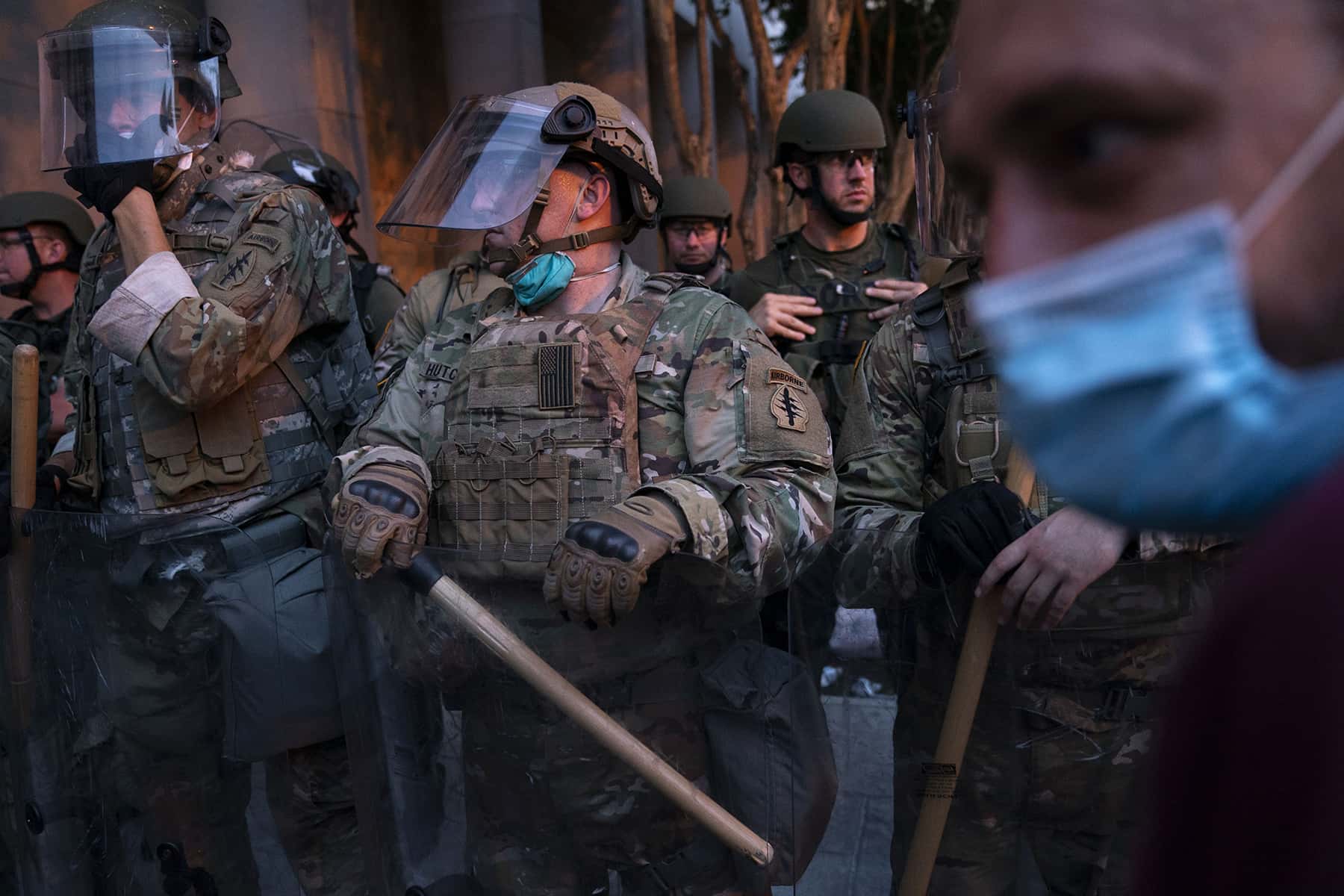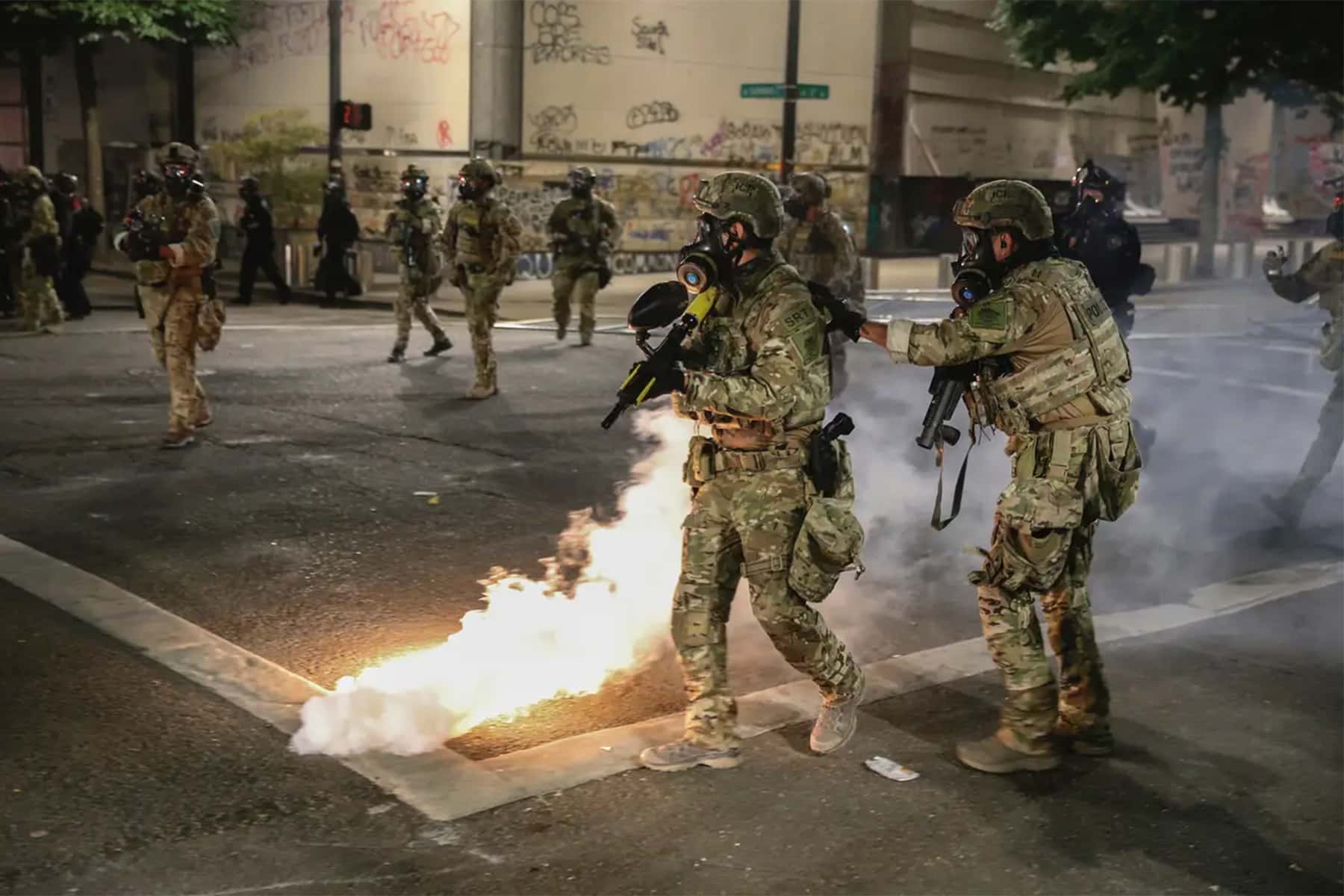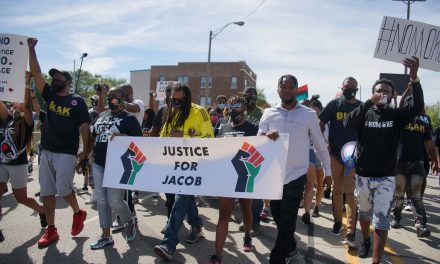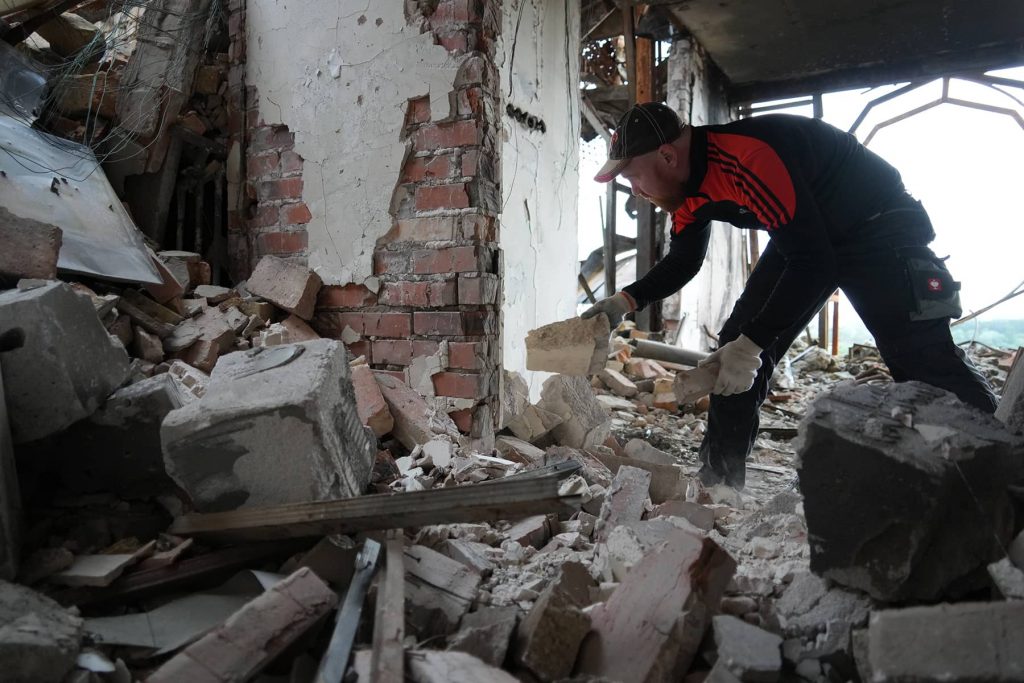
A cloud has been hanging over Milwaukee ever since the Trump administration signaled that the city was on a list of places that would receive deployments of federal agents to bolster local policing.
Top lawmakers and law enforcement officials at the state and local levels have spoken out against a deployment that could be a replay of the scenes from Portland, where protesters have been yanked off the streets by paramilitary soldiers in unmarked vans.
In a conversation on July 29, Senator Tammy Baldwin (D-Wisconsin) addressed the growing concerns of snatch and grab operations targeting protesters. In the midst of the news from Portland, “it was very disturbing to hear, without any warning, that the feds were coming to Wisconsin,” said Baldwin.
But after she spoke with the U.S. Attorney for the Eastern District of Wisconsin Matthew Krueger, Baldwin said some of her anxieties were eased. “It appears to be the agencies working together more closely to deal with a very significant uptick in crime, especially homicide,” she said. “These will primarily be investigators and not folks who will be in uniform on the street in any way.”
Back in December 2019, Milwaukee first learned that it was on a short list of seven U.S. cities that would receive federal assets as part of Operation: Relentless Pursuit. The operation was designed to augment efforts against violent crime, with an upfront budget of $71 million for the whole operation nationwide. At the time, Milwaukee’s rates of homicide were down by 32%. The onset of the pandemic, however, has ushered in a wholly different world. Over the last year, homicides have doubled in the first half of 2020, along with higher rates of domestic violence and drug overdose.
“We’re now at 95 homicides, we’re not done with the month of July yet,” said Milwaukee District Attorney John Chisholm during a virtual Public Safety and Health Committee meeting for the city of Milwaukee. “I haven’t seen these numbers since the early 1990s. I’m deeply concerned about it. And I don’t want us to fall into the trap of saying that we’re going to reject resources that might help us address this violent crime surge.” After the news from Portland, Chisholm also felt concerned that Milwaukee was, as he described to the committee members, “casually” mentioned by White House officials as next to receive federal agents.
But now it seems that Milwaukee’s assets are associated with Operation: Legend, a re-branding of Relentless Pursuit. A press release from the Eastern District of Wisconsin’s U.S. Attorney’s Office described “the expansion of Operation Legend to Milwaukee” as “a continuation of violent crime reduction efforts that began in Milwaukee under Operation Relentless Pursuit.
A total of 25 personnel from the Federal Bureau of Investigation (FBI), Drug Enforcement Administration (DEA), U.S. Marshals Service, and Bureau of Alcohol, Tobacco, Firearms and Explosives (ATF) will be allocated for Milwaukee. These agents will be assisted by the Milwaukee Police Department (MPD) and the Milwaukee County Sheriff’s Office (MCSO), according to the U.S. attorney’s office.
The federal Department of Justice (DOJ), through the Bureau of Justice Assistance, has also made $1.9 million available to support Operation: Legend in Milwaukee alone. That’s up from the $71 million allocated for the entire nationwide effort for Relentless Pursuit, and in addition to $10.2 million sent to MPD and other police departments including Wauwatosa and Cudahy to hire 29 new officers. Another $100,000 has been provided by ATF to assist Milwaukee law enforcement with installing and maintaining shot detection technology.
Protest suppression is not welcomed here
Chisholm addressed several concerns surrounding the Portland deployments. “Kidnapping, false imprisonment, unlawful assault,” he said, “those are simply crimes. Those are crimes no matter who commits them,” he added, “whether it’s a federal agent or a citizen. You can’t do that, not in the United States, and it won’t be tolerated here.”
Department of Homeland Security (DHS), Federal Protective Services, Border Patrol, and other agencies were reported as sending forces into Portland.
Chisholm noted that, as far as he is aware, DHS and other agencies linked with the Portland controversy are not part of Operation: Legend. In past cases, however, DHS appears to have been involved in drug investigations. On page 11 of the investigative file related to the shooting of Jermaine Claybrooks, a suspected drug dealer killed by task force members from MPD, the West Allis Police Department, and DEA, a DHS agent is listed as having been involved in the investigation which led to the Claybrooks shooting.
In a statement on July 23, MPD stated that it “respectfully declines the deployment of federal agents in Milwaukee” in response to protests. Mayor Tom Barrett also condemned the use of personnel for that purpose. “Given the events that have taken place in Portland,” said Barrett, “I am extremely concerned that President [Donald] Trump is looking for opportunities to create more political division in cities across the nation. Federal agents are not welcome here for that purpose … if the federal presence is to truly cooperate with local law enforcement, then it is imperative the limits of their activities are clearly delineated and monitored.”
Gov. Tony Evers expressed his discontent as well, in a letter to the president. “I have full faith and trust,” wrote Evers, “not only in the people of Wisconsin, but the people who serve our police forces at the local level. Amping up the federal presence, I believe, will create more turmoil.”
Wisconsin State Attorney General Josh Kaul decried what he described as “fascist tactics” by the Trump administration, particularly over recent weeks. “I don’t use the phrase ‘fascist tactics’ lightly,” he said. “But there is no more accurate way to describe this administration’s repeated resort to and incitement of racism, xenophobia, and violence.” He implored his federal colleagues to “oppose this action unless and until the Trump Administration commits to working collaboratively with state and local officials and is much more transparent about its plans.
Despite promises that federal agents will not target protesters, participants in Milwaukee’s more than 50 days of Black Lives Matter marches aren’t so confident. Kruger’s office recently announced charges against Joshua Lusk, 32, related to the burning of a house suspected of being involved in sex trafficking last month.
Following the burning, community organizer Vaun Mayes and others were arrested, and released a little over a day later. Activists including Frank Nitty, who was also there as dozens of residents surrounded the duplex, also felt they were being monitored by law enforcement following the incident. One of the recently issued directives to MPD Chief Alfonso Morales is an investigation into why Mayes was initially arrested. The state DOJ is also actively conducting investigations involving protesters in the Milwaukee area.
Accountability and transparency
During his discussion with committee members, Chisholm highlighted the chain of accountability for law enforcement operations in Milwaukee, including his office, the state attorney general and the U.S. attorney’s office. “No actions can be taken by law enforcement without those being reviewed at this level,” he explained. Nevertheless Chisholm said, “we have to remain vigilant, we have to remain disciplined,” in watching who comes to Milwaukee and for what purpose.
“All these things are taking place in the context of very legitimate expressions of concern and demand that law enforcement engage the community in a very different way,” said Chisholm. “We’re going to strongly support those voices, and we’re going to keep everybody in the community safe while we’re doing this.”
Dаvе Kіllеn and Drеw Аngеrеr
Originally published on the Wisconsin Examiner as Surge of federal law enforcement operations in Milwaukee raises questions
Donate: Wisconsin Examiner
Help spread Wisconsin news, relentless reporting, unheard voices, and untold stories. Make a difference with a tax-deductible contribution to the Wisconsin Examiner















